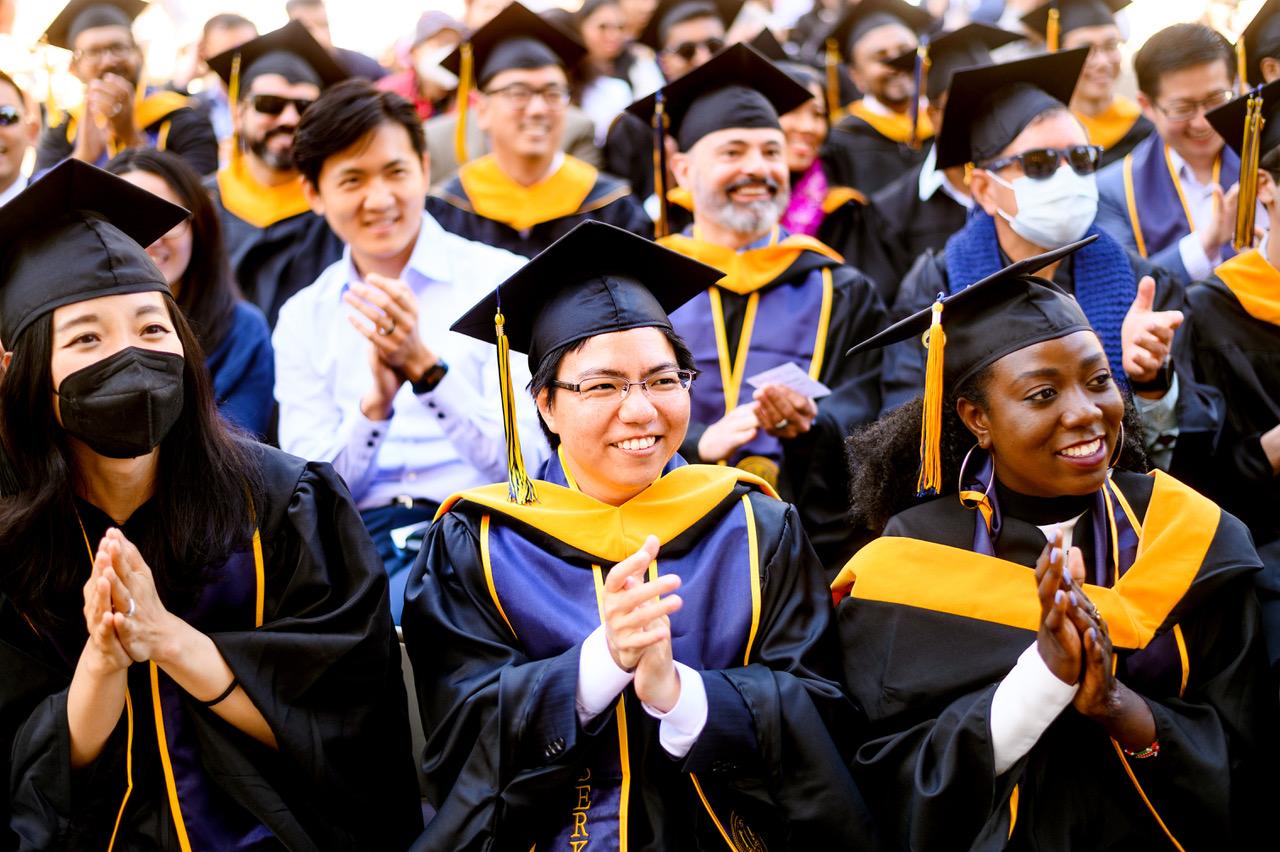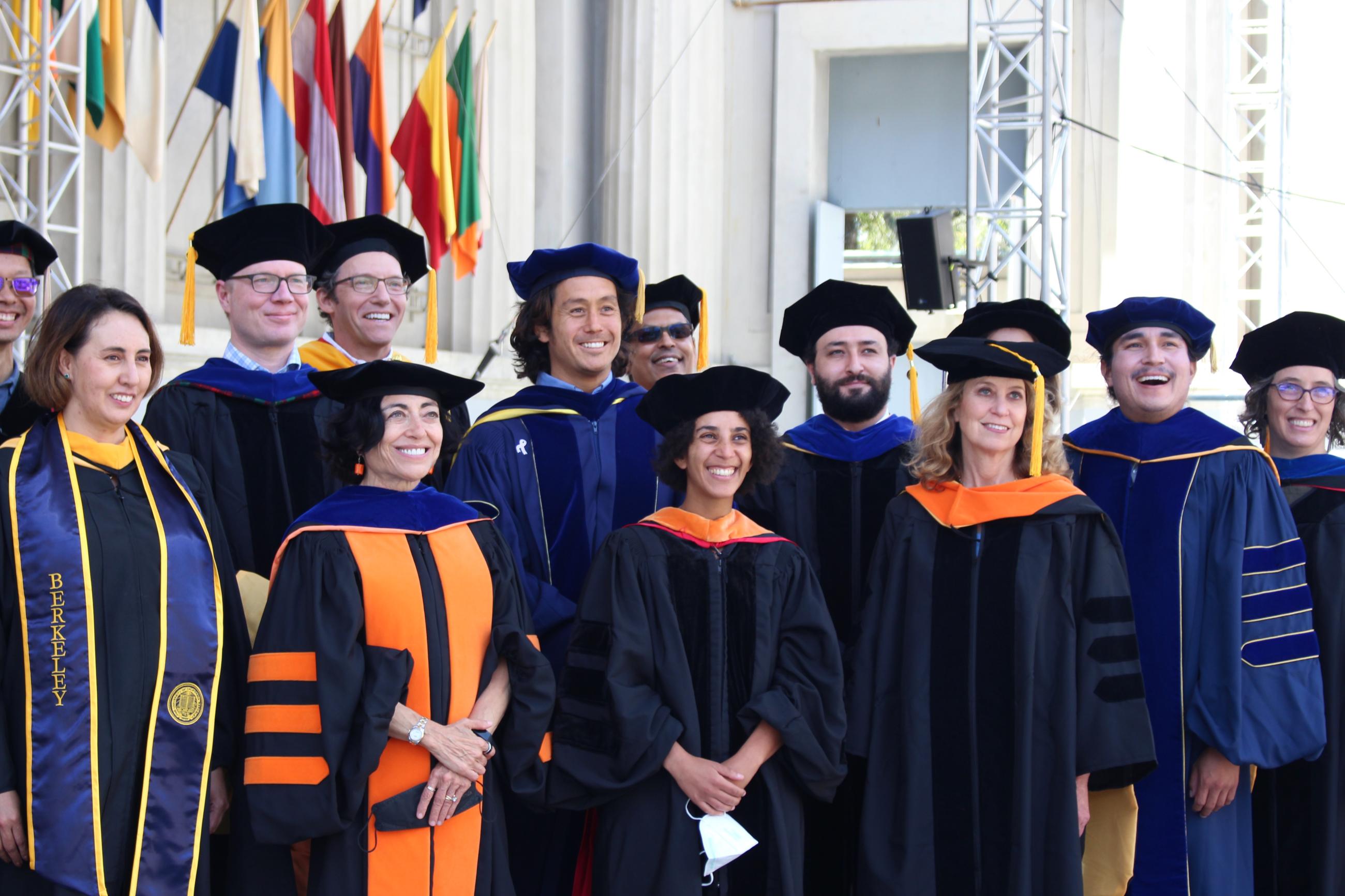This article is cross-posted from
May 2022 Commencement Speakers Champion Community, Connection, Collective Action
May 17 | UC Berkeley's School of Information

“First things first, we need to celebrate,” said May 2022 UC Berkeley School of Information commencement speaker Timnit Gebru. “You did this. I don’t have words to describe the kind of time we’re in, you’re not crazy, it's real.”
The class of 2022 completed their master’s and doctoral degrees through a truly extraordinary time in history. As Gebru said, we are experiencing a pandemic, wildfires, war, and more, and yet our students continue to accomplish so much.
On May 16, 2022, the School of Information celebrated 147 graduates of I School programs, and welcomed students back to the first in-person commencement celebration since January 2020, just before the pandemic upended so many traditions and norms. There were 162 graduates at the ceremony held outdoors at the Hearst Greek Theatre, including 46 “pandemic grads” who graduated in 2020 or 2021 and chose to celebrate their graduation in person this month.
Gebru advocates collective action, interconnection
Gebru, Executive Director of the Distributed Artificial Intelligence Research Institute (DAIR) and one of the most prominent researchers working in the field of ethics in artificial intelligence, was famously forced from her position at Google in 2020, where she co-led the Ethical Artificial Intelligence research team. As she said to the graduates, what allowed her to persevere was the power of collective organizing. She had a community behind her and she urged the graduates to keep community building and collective organizing wherever they went next. “When people talk about whistleblowing, it makes it sound like a solitary activity with one David facing a Goliath,” she said. “In my view, what really changes things is concerted, collected activity. If we all take on a little bit of risk, we keep all of us safe.”
“Stopping harm where you are can have consequences that reverberate in so many places. Work that you do locally, that you may not think is so important, can have large consequences.”
Gebru touched on interconnectedness, reminding graduates that a small action they take locally can have ripple effects. “Stopping harm where you are can have consequences that reverberate in so many places. Work that you do locally, that you may not think is so important, can have large consequences.”
She referenced the deadly ongoing war in Ethiopia, which, she said has been absent from the news cycle and which she has been harassed online for being vocal about. “Let's not forget that we are all so intimately connected. What happens over there will come to our door one way or another.”

“But what consoles me,” she said, “is that there will always come a time when you feel lonely if you stand on the right side of history. That’s the whole point. If that weren’t the case then there wouldn’t be a need to speak up.”
She also told the graduates that amid tragedy and horrors in the world and close to home, they must always make time for joy. “So let’s end with this reminder: always put your mask on before helping others,” she said. “The goal is not to burn out or to be a sacrificial lamb. The goal is for all of us to work collectively for a better future for all of us.”
Student speakers uphold community
Student speakers from each program, nominated by their peers, also addressed the graduates.
“We started our journey 20 months ago at the I School in the midst of the pandemic and many of us were nervous about going back to school after so many years and juggling a family, full-time work,” said MICS speaker Roselene Gomes. Gomes credited the graduate's success in the program to the I School community: “The entire program was built on support, empathy, and kindness. We wouldn’t be here today if it wasn’t for our dedication, resilience, and support from one another, faculty, and instructors.”
MIDS speaker Vamsi Sistla drew laughs with his Lord of the Rings-themed speech, which also focused on community and equity. “While Frodo had to fight the temptation of wearing the ring,” he said, “our temptations might be falling under the spell of selection bias, buying into spurious correlations, and failing to ensure algorithmic fairness in our work. Just like Frodo, we can only succeed if we resist our implicit biases. As Professor Ames would say, we should defend those who cannot defend themselves with our decisions — to make the field of data science safe and equitable to all its stakeholders.”
Ph.D. speaker Shazeda Ahmed said, in the spirit of academic collaboration, that her speech was co-written with fellow Ph.D. graduates, and “a love letter to the I School’s Ph.D. students.”
“Doing a Ph.D. can be extremely isolating,” she said, “but as I hope becomes clear soon, what starts out as an individual experience quickly becomes a collective act of continuous community-building.”
“Eventually,” Ahmed concluded, “we build the connections, set of experiences, and knowledge that help us put something out into the world that makes a difference. It might not ever feel like enough. Yet it’s indelibly our contribution, our mark on a field that is constantly changing.”
MIMS speaker Joanne Ma recalled how the graduating cohort bonded and built community while starting their program remotely. “This community of care doesn’t just happen anywhere,” Ma said. “Instead, it is the unique culmination of people who are invested in holistically learning to be a technologist — someone who can break down privacy policies, give constructive design critique, conduct qualitative and ethnographically rooted research, and audit algorithmic systems, just to name a few."
“This community of care doesn’t just happen anywhere ... This care, and desire to deeply know and seek interdisciplinary expertise, is what makes the I School a class of its own, worldwide.”
“This care,” she said, “and desire to deeply know and seek interdisciplinary expertise, is what makes the I School a class of its own, worldwide.”
